Pond Installation – A Quick Review
Pond Installation as of 9/8/24 – Adding a pond to your backyard or garden can create a serene, natural escape right at home. Whether you envision a tranquil koi pond, a cascading waterfall, or a peaceful reflecting pool, pond installation can dramatically enhance your outdoor space. In this comprehensive guide, we’ll cover everything you need to know about pond installation, from planning and design to maintenance and care.
Why Install a Pond?
Ponds offer numerous benefits, both aesthetic and functional. Here’s why you might consider installing one:
- Enhances Visual Appeal: A well-designed pond adds beauty and elegance to your garden, creating a focal point that draws the eye.
- Creates a Relaxing Atmosphere: The sound of flowing water and the sight of fish swimming can help reduce stress and promote relaxation.
- Supports Wildlife: Ponds provide habitat for various species, including fish, amphibians, and beneficial insects, fostering biodiversity.
- Improves Property Value: A professionally installed pond can increase the value of your property by enhancing its overall appeal.
Planning Your Pond Installation
Before diving into the installation process, careful planning is crucial to ensure your pond meets your expectations and fits well within your space. Here’s how to get started:
- Determine the Purpose and Style Consider what you want from your pond. Are you interested in a koi pond, a naturalistic water garden, or a simple reflecting pool? Each type of pond has different requirements and design elements. Decide on the style and purpose to guide your planning.
- Choose the Location Select a spot in your garden that gets a good balance of sun and shade. Too much sun can encourage algae growth, while too much shade can affect plant growth. Ensure the location is easily accessible for maintenance and away from large trees that could drop leaves and debris into the pond.
- Size and Depth Determine the size and depth based on your space and the type of pond you want. Koi ponds, for instance, need to be deeper to accommodate the fish and provide adequate water volume. A small, shallow pond may suffice for a simple water feature.
- Plan the Design Sketch out your pond design, including any additional features such as waterfalls, fountains, or stream beds. Consider how these elements will integrate with the surrounding landscape and complement your garden’s overall design.
- Budgeting Establish a budget for your pond project. Costs can vary widely based on size, complexity, and the quality of materials used. Include expenses for installation, equipment, plants, and any additional features.
Pond Installation Process
Once you’ve planned your pond, the next step is the installation. Here’s a general overview of the process:
- Excavation Begin by excavating the pond area according to your design. The depth and shape of the excavation will depend on the type of pond you’re installing. Ensure the edges are smooth and the base is level.
- Lining the Pond A pond liner is essential to prevent water leakage. There are various types of liners available, including flexible rubber liners and pre-formed rigid liners. Lay the liner carefully, smoothing out any wrinkles and ensuring it fits snugly against the pond edges.
- Installing Equipment Install necessary equipment such as pumps, filters, and skimmers. Proper installation is crucial for maintaining water quality and circulation. Position the equipment according to the manufacturer’s instructions for optimal performance.
- Adding Water and Testing Fill the pond with water and test the system to ensure everything is functioning correctly. Check for leaks and make adjustments as needed. Allow the pond to settle for a few days before introducing any plants or fish.
- Landscaping Enhance the pond area with landscaping elements such as rocks, plants, and mulch. This not only improves the visual appeal but also helps to blend the pond seamlessly into your garden.
Maintaining Your Pond
Proper maintenance is key to keeping your pond healthy and attractive. Here are some tips for ongoing care:
- Regular Cleaning Remove debris such as leaves and algae regularly to keep the water clean. Use a pond net or vacuum to clean the pond floor and maintain the filtration system.
- Monitor Water Quality Check the water quality periodically, including pH levels, ammonia, and nitrate levels. Proper water balance is crucial for the health of your fish and plants.
- Seasonal Care Adjust your maintenance routine according to the seasons. In winter, you may need to use a pond heater or de-icer to prevent freezing. In spring and summer, focus on controlling algae growth and ensuring proper plant care.
- Inspect Equipment Regularly inspect and clean your pond equipment, including pumps and filters, to ensure they are functioning properly. Replace any worn or damaged parts as needed.
Pond installation is a rewarding project that can enhance the beauty and tranquility of your outdoor space. By carefully planning, choosing the right materials, and following proper installation procedures, you can create a stunning pond that will be a source of enjoyment for years to come. Remember to consider ongoing maintenance to keep your pond in top condition and continue to appreciate its natural beauty.
Ready to transform your garden with a beautiful pond? Start by researching pond installation services or explore DIY options to bring your vision to life. With the right planning and care, your pond will become a cherished feature of your outdoor oasis.
Check out our store for all your water gardening needs! Aquascape products are Aquascape Inc. Certified.
Thanks for reading at Meyer Aquascapes! We hope you’ve enjoyed our post on garden pond design. Please leave a comment below if you liked it or have any questions. We’d love to hear from you! Thanks for stopping by!
How can we help?
Things to consider before buying a garden water feature
Before you invest in a garden water feature to fill up that empty outdoor space and add a wow factor to your property, there are many logistics to consider. It includes right from the supply of water to the general maintenance. Here are some things you should consider first.
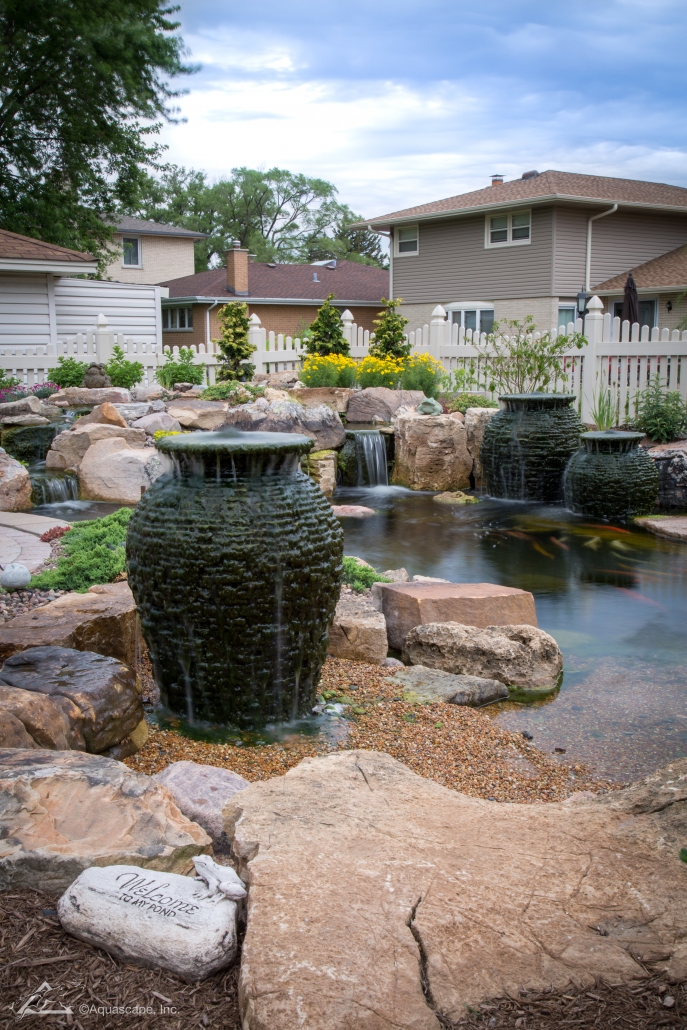
Making water supply available
It is not necessary to always have a water supply. Of-the-shelf water features are self-contained with a need to top them up with water occasionally. If your garden water feature has moving water, you will need to invest in a water pump and an electric supply to drive the pump. Alternatively, you can build a water feature with a solar-powered pump as well. Pretty much all water features with moving water will require a water pump with an electric or solar-powered energy supply to help the pump drive the water.
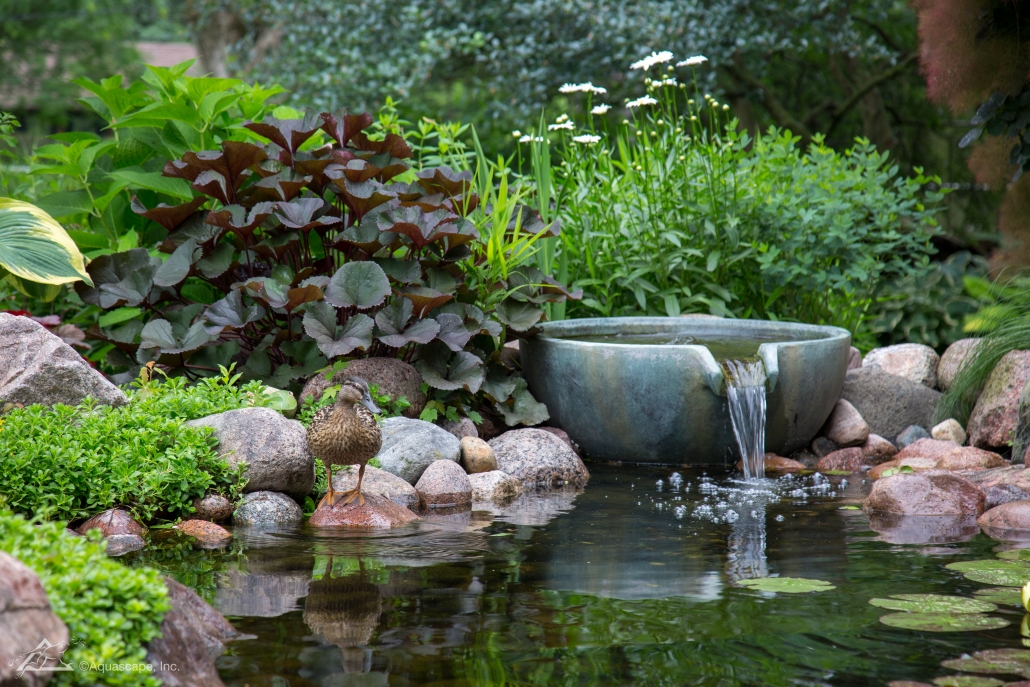
Maintaining water features
Think about future maintenance and cleaning. Water will get contaminated with dust, algae, leaves, dirt. So you’ll need to know how to drain it, dismantle it and clear out. Thinking about this in advance will help better plan your placement of garden water features. For instance, if it is installed under a tree, leaves are likely to fall and accumulate in the water, which will mean even more maintenance.
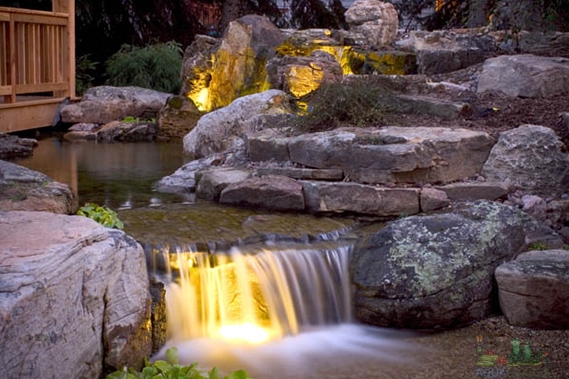
Selecting the type and style of water feature
Consider the background settings to determine the overall style and design aspect of the water features. Classic water features like a fountain or a waterfall may look good if it’s placed amongst plants. If the settings are modern, then water feature style will also have to be modern, like glass, but an older style like cherubs will look out of place in a modern setting. Another option is worth having a look at is lighting the water. In such a case, it’s better to opt for water features with an in-build lighting option else; you may have to spend extra on setting up different lights. Lighting can make the water features look good in all seasons throughout the day.
Decorative Garden Water Features
Water features provide homeowners with a unique and creative way to decorate their outdoor living space. Many homeowners desire the soothing sounds of running water, but are just not ready for a pond or simply can’t afford one. Aquascape’s AquaBasin® system, paired with our handcrafted line of pond decorations and accessories, provides the perfect solution for capitalizing on these small, entry-level water features. Here are some of the decorative garden water features from aquascapes
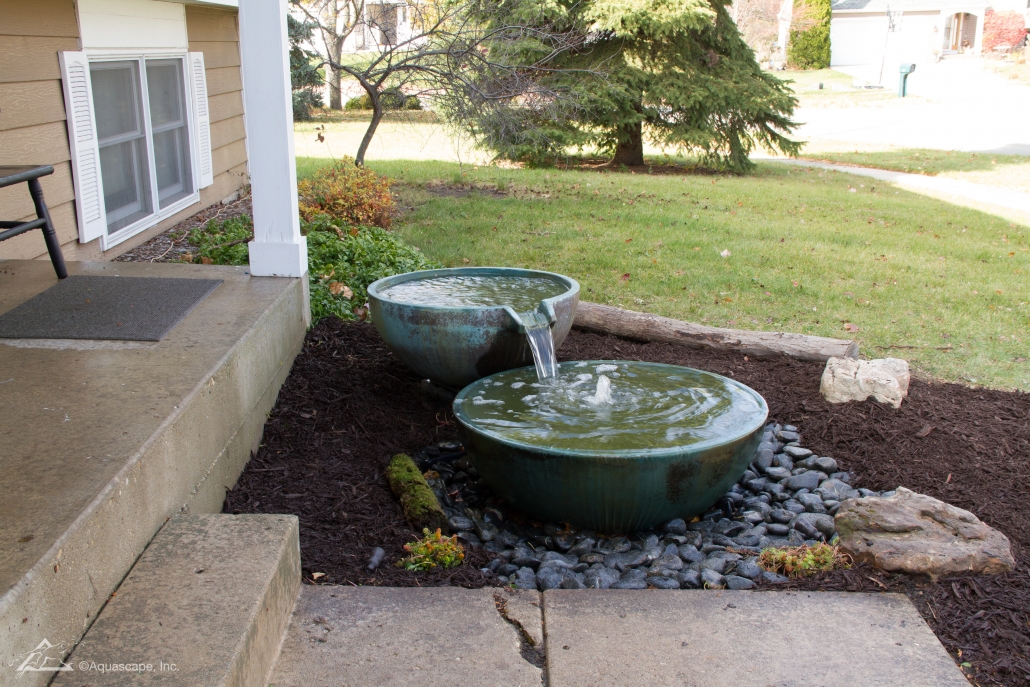
Aquascape spillway bowls
Aquascape spillway bowls and basins can be used in a variety of ways to spice up your front or back yard. Notice the spillway waterfall that provides a relaxing atmosphere to any person nearby! These spillway bowls are not only relaxing and peaceful, but also beautiful to the eyes. Notice the water fountain in the center of this spillway bowl. These beautiful pieces of art have been traced back in history to Rome, and the main reason they have been around so long is because of how they affect those around it. Entrancing yourself with these water basins will become a daily occurrence as you grow accustomed to the nature being brought into your yard!
Spillway bowls typically come with lighting, but be sure they are on a timer so they come on at just the right time! Whether you have a large basin, small basin, or several basins, just one light per spillway bowl will be sufficient.

Aquascape water fountains
Sometimes adding in a fountain can add a focal point to the water garden and provide a relaxing moving-water atmosphere. Watergardens are unique in the aspect that they can be designed in a way that compliments the landscape provided.
Many water garden features don’t have water at all. We call these Fire Fountains. Some fire fountains include water, and some don’t. A few of our water features have the capability of both! When considering which fountain to place inside your water garden, try to think of where your guests will walk around. Are they on the patio? Is the fountain close enough to the water garden and your guests? When we install a new water garden, we consider all aspects of the design to create a feature that will be both pleasant to your guests and your family.
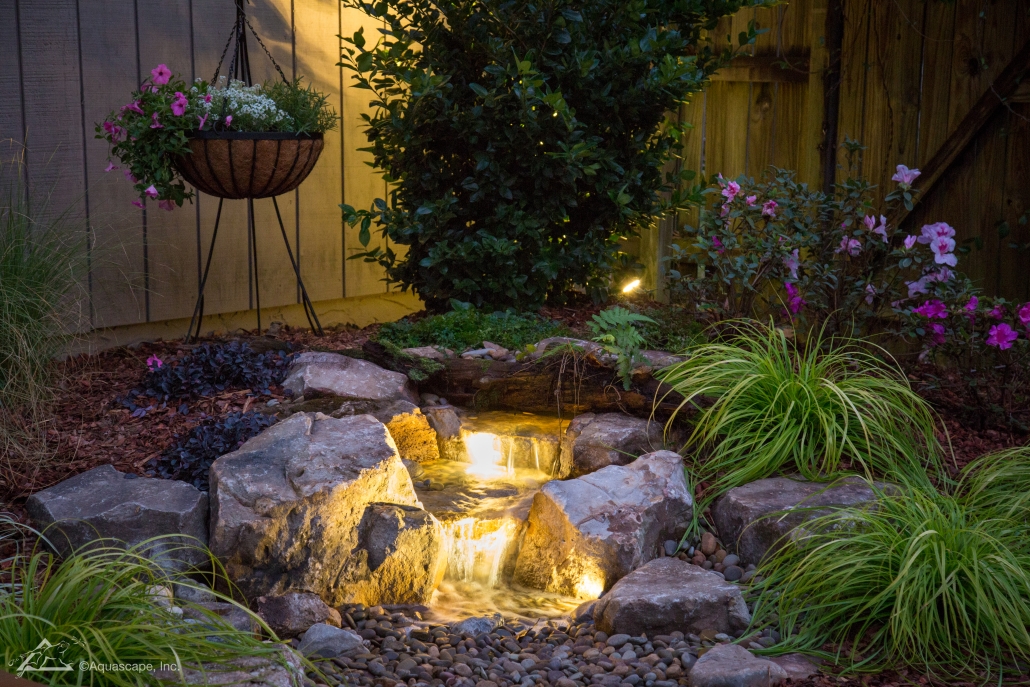
Aquascape water garden lightning elements
Watergarden lighting doesn’t have to be just for waterfalls or for you to see your fish! Many aquascape urns already have lighting inside the feature so that you can enjoy it even at night. Imagine a backyard water feature with the focal point being a stunning display of water, fire, and light. Paradise is just around the corner with our beautiful water features.
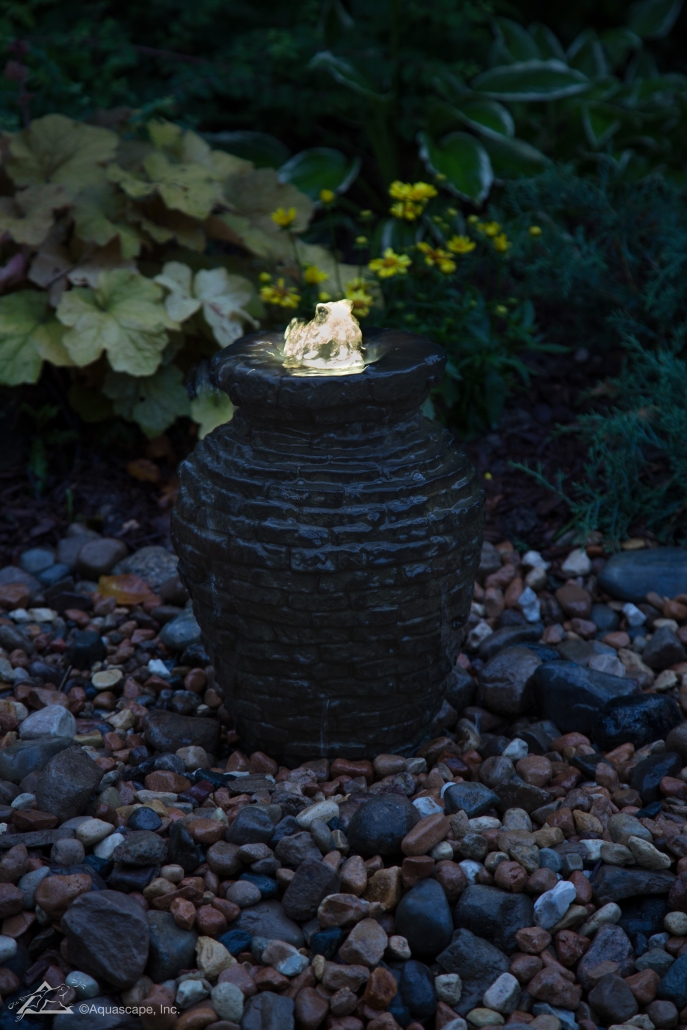
Water Garden Urns
Water garden urns come in a vast array of sizes, colors, shapes, and water flow. These urns are a highlighted product by aquascapes for one reason; they’re beautiful. What better reason for impressing your guests is there?
Why should you have water features in your garden
Any water features can easily mix and blend with your backyard. You can add a water pond, artificial river, or fountain in your garden, and it will immediately become a focal point of your garden or backyard. Water features can be suited to large as well as small gardens. They can change the complete ambiance of your backyard.
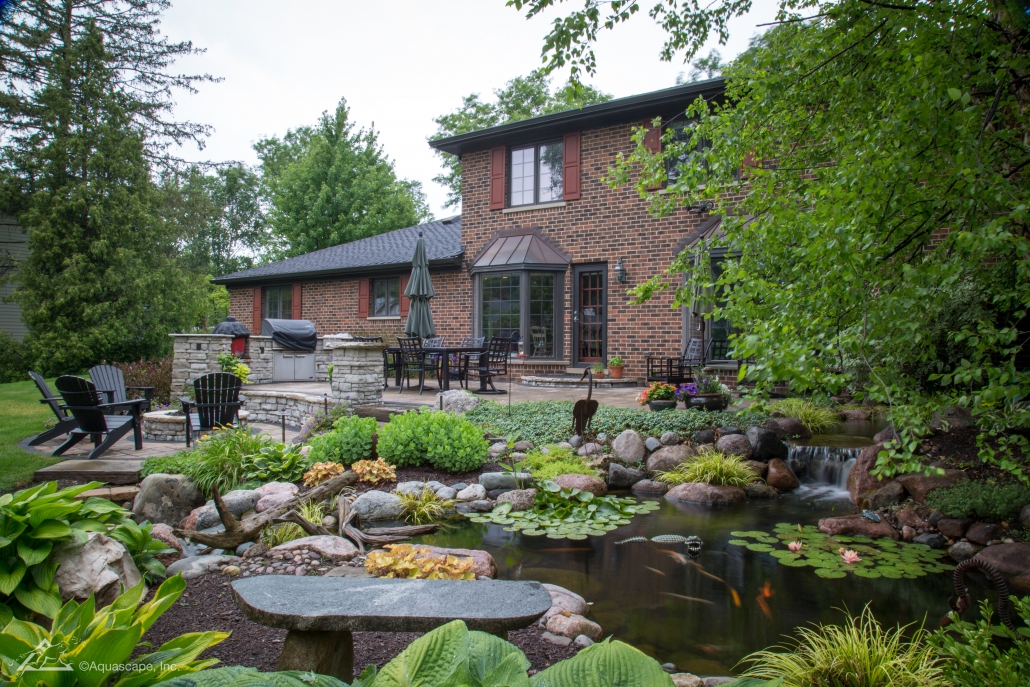
Water introduces calmness in your garden.
A water feature such as a fountain or a waterfall creates a tranquil and serene sound that helps calm down your mind. A garden with water features is the best place to unwind yourself after a hectic workday. A garden with water features provides a small piece of heaven right into your backyard. You can add other water garden features like decorative stones, water plants, and flowers for more therapeutic effects.

Adding water features makes your garden look bigger.
The reflective properties of water tend to make the spaces look bigger. For more enhanced effects, you can use dark colours for water features like waterfall stones or fountains. Another way to enhance this effect is by using the underwater lights at night time. You can save on energy bills on these lights by using solar-powered lights that charge during the day to glow at night.
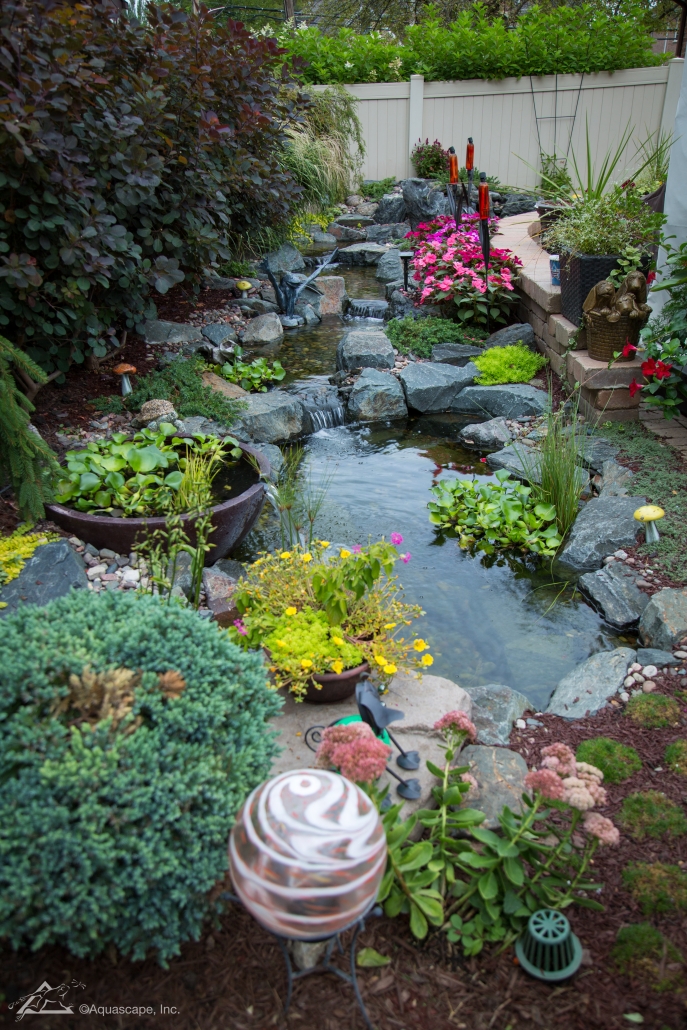
Having water in the garden helps to attract wildlife.
Birds and other small wildlife animals like frogs frequent your garden when it has sources of water. The garden pond or fountain acts as a source of fresh drinking water for birds. A garden pond can also attract small aquatic animals. You can also add fishes in garden ponds to create a natural aquatic habitat.
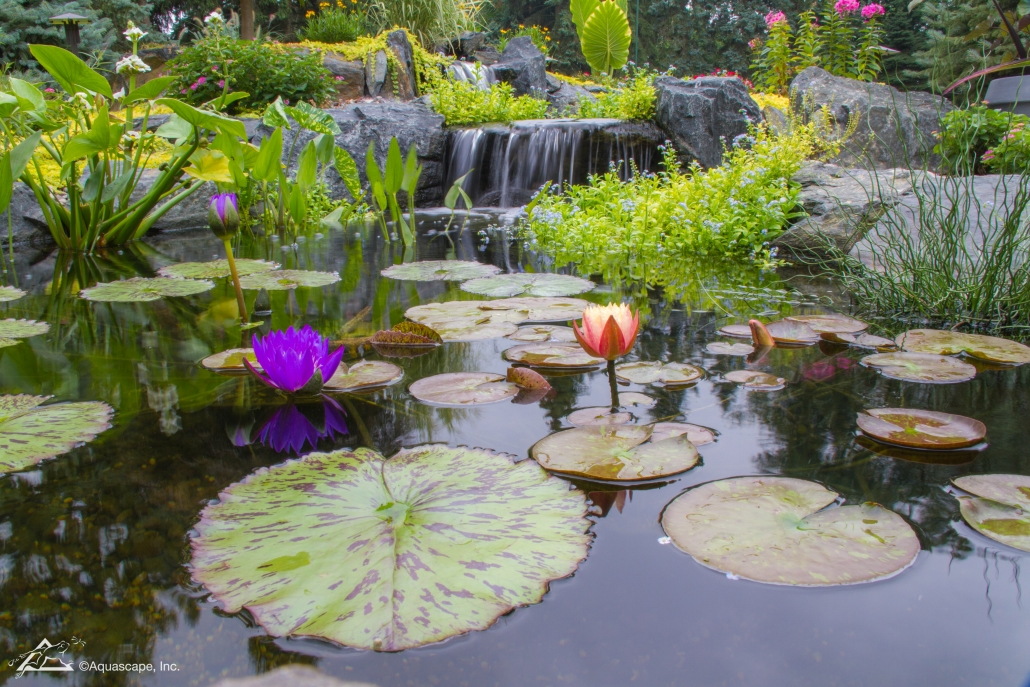
Maintenance of water features is easy.
Water features such as ponds may require regular cleaning up. However, the cleaning task is a lot easier. Also, the water machinery installed like water pumps or water filters needs to be maintained regularly for the proper function of the water features and to prevent any malfunctioning and blockages. These tasks can be easily carried out at home without incurring any additional costs. It also provides a very indulgent activity helping to take away your mind from work-related stress.

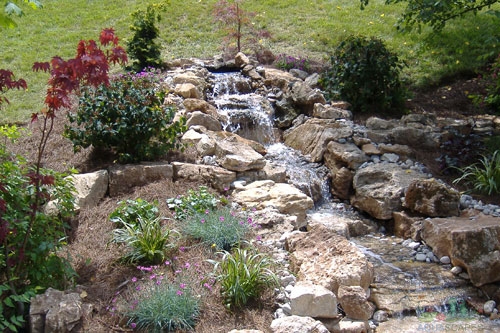

 Meyer Aquascapes
Meyer Aquascapes